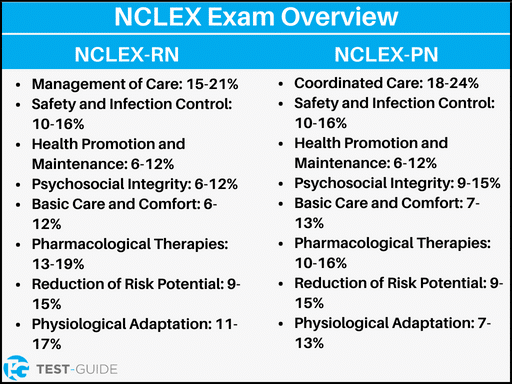Full-Length NCLEX Practice Test
Choose between our free NCLEX practice test (full-length) or our smaller sets of questions (practice sets).
Who Takes the NCLEX?
Nursing students who have completed their nursing program will take the NCLEX. You will need to pass the NCLEX to apply for a nursing license in your state.
- Students wishing to become an RN will take the NCLEX-RN.
- Students wishing to become a LPN or LVN will take the NCLEX-PN.
Both exams are similar and contain the same number of questions and time limits.
Overview of the NCLEX Exam
The NCLEX-RN and NCLEX-PN exams are similar to each other in terms of number of questions, time limits, how the exam is given, and types of questions.
- NCLEX-RN: 85 to 150 Questions. 5 Hour Time Limit.
- NCLEX-PN: 85 to 150 Questions. 5 Hour Time Limit.
Both exams are computer adaptive. This means that the questions will adapt as you progress through the exam. Some students may only need 85 questions to pass, while others may need all 150 questions.
Make sure to use the NCLEX practice questions above to prepare!
NCLEX-RN Summary
The NCLEX-RN will test you on the following subjects:
- Management of Care: 15-21%
- Safety and Infection Control: 10-16%
- Health Promotion and Maintenance: 6-12%
- Psychosocial Integrity: 6-12%
- Basic Care and Comfort: 6-12%
- Pharmacological Therapies: 13-19%
- Reduction of Risk Potential: 9-15%
- Physiological Adaptation: 11-17%
You can also expect at least 3 case studies, with each case study having 6 questions. There will also be some “standalone” questions. These questions are similar to the case studies, but only have 1 question associated with them.
NCLEX-PN Summary
The NCLEX-PN will test you on the following subjects:
- Coordinated Care: 18-24%
- Safety and Infection Control: 10-16%
- Health Promotion and Maintenance: 6-12%
- Psychosocial Integrity: 9-15%
- Basic Care and Comfort: 7-13%
- Pharmacological Therapies: 10-16%
- Reduction of Risk Potential: 9-15%
- Physiological Adaptation: 7-13%
You can also expect at least 3 case studies, with each case study having 6 questions.

For a more detailed breakdown of the exam, visit our NCLEX exam overview. You can also visit the official source for additional information.
Scoring of the NCLEX
The NCLEX uses a computer adaptive test and a complex scoring system. The NCLEX is a pass/fail test.
The NCLEX uses a logit scoring system. Without getting too technical, you will need to receive a logit score of 0.00 or higher to pass the exam. If you received a negative logit score, that means you did not pass the exam.
While taking the exam, your logit score in constantly being calculated based on how you are answering questions. This is why some students may end up answering more questions than others.
Students who pass the exam will be informed that they passed. Students who failed the exam will have an opportunity to view a detailed score report (only if you failed).
NCLEX Administration, Fees, and Requirements
- In order to register for the NCLEX, you must first request a license/registration application from your nursing regulatory body (NRB).
- You must submit your application materials and licensing fees to your NRB.
- You can then register to take the NCLEX through Pearson Vue.
You can find more information and register for your NCLEX exams here. Eligibility requirements will vary because each NRB has it’s own requirements for eligibility.
Contact your NRB to confirm your eligibility requirements. Be sure that you are enrolled in the correct exam (RN/PN) and have practiced the appropriate NCLEX test questions.
Lastly, you can expect to pay $200 to take the NCLEX.
Studying for the NCLEX
The NCLEX is one of the highest stakes exams a nursing student can take. Here are some tips to use when studying for the NCLEX:
- Use a NCLEX Practice Exam to Get a Baseline: Using a practice exam will help you figure out where you stand. You may find that you really struggled and need to dedicate some serious study time to the exam.
- Narrow Down Struggle Areas: Take step #1 a step further and figure out which specific topics you struggled with. You can use this information to study more efficiently and save yourself some time.
- Do Not Cram: Make sure to give yourself plenty of time to study for the exam. You will save yourself some stress by giving yourself enough time to study.
- Consider Investing in a Full-Fledged Prep Course: A complete prep course will provide you with everything you need and it will ensure you do not skip over any information you should know.
- Take a Simulated Exam: One of your last steps should include taking a simulated exam. A simulated NCLEX exam will help you figure out where you stand and either confirm that you are ready for the actual exam or let you know if you need to continue studying.
Benefits of Using a NCLEX Practice Test
There are many benefits of using a NCLEX practice test. Some of the major benefits include:
- Familiarity with the Exam: The NCLEX is a unique exam. The questions asked on this exam are very different from questions you have seen on other exams. This relates to both the types of questions and the format in which they are asked.
- Practice with Timing: The NCLEX is a timed exam. You will have 5 hours to answer 85-150 questions. You can get your timing down by taking our full-length exam above.
- Pinpoint Trouble Areas: You can pinpoint the areas you struggle with by taking our NCLEX practice exam. At the end of the exam, you will receive a detailed score report that outlines the specific areas you struggled with. You can then focus your studies on those areas.
- Utilize Answer Explanations: You can use our answer explanations to learn new and key concepts. We offer detailed answer explanations for every single problem.
Frequently Asked Questions
What are the types of NCLEX exams?
There are two types of NCLEX exams. The NCLEX-RN and NCLEX-PN. The NCLEX-RN is for those students who wish to become a registered nurse while the NCLEX-PN is for those students who wish to become a vocational or practical nurse.
How long is the NCLEX exam?
The NCLEX exam will last for a maximum of 5 hours.
How many questions are on the NCLEX?
There will be a minimum of 85 questions and a maximum of 150 questions. This goes for both the NCLEX-RN and NCLEX-PN.
How much does it cost to take the NCLEX?
The cost for US students to take the NCLEX exam is $200 while the cost for Canadian students is $360CAD. There are various additional fees that may be tacked on for special cases like an international scheduling fee.
What is a good NCLEX score?
The NCLEX is a pass or fail exam. You will need to receive a logit score of 0.00 or higher to pass.

